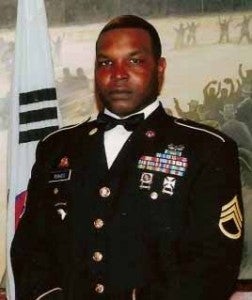SSG Anthony Reaves tells story of a life changed
Published 11:00 pm Wednesday, December 26, 2012
Christmastime is, for some, a time of reflection and remembrance. It can be a time of “taking stock” of one’s life – the successes and the failures, of hopes realized and of dreams forgotten. It can be a time for acknowledging those who, along the way, have made a difference in one’s life. So it was this Christmas for United States Staff Sergeant Anthony Reaves. He has a story to tell.
“You might ask why my story is so great or so different,” Reaves said. “My story started in Miami but it was in Brundidge that my life changed. I went from being a school bully and a gang member to looking in my grave. Four people in Brundidge saved my life – Dr. Mark Bazzell, Mrs. Joanna Kilpatrick, Danny Suber, my football coach and Brundidge Police Chief Moses Davenport.”
Reaves said he would not be around to tell any story if it had not been for his four “heroes.”
“Mrs. Kilpatrick used to tell me I could write a book about my life,” Reaves said. “I lost my father at an early age and I was there to hear my mother’s last words before she passed away.
“In combat zones, I have watched friends die around me and I’m still standing through it all. I want to tell my story because every lost child needs to know that there are great teachers and police officers around that can make a difference in their lives.”
Reaves moved with his family to Brundidge in 1990 and attended Pike County High School.
He was not a model student. In fact, he was a troublemaker.
“I was quick to fight and resisted any kind of discipline,” Reaves said.
“I had no respect for any kind of authority. I was constantly in trouble – being sent to alternative school or getting suspended. I didn’t care for anything. I joined a gang there in Brundidge, the Vice Lords or DBL, Down By Law. I was headed for prison or an early grave but there were those who cared enough about me to not give up on me. They saved my life and put me on the right path.”
Bazzell was the principal at Pike County High School and Reaves said that Bazzell must have seen something worthwhile in him.
“I had lost my father and Dr. Bazzell was more like a father to me than a principal,” Reaves said. “He would take me in his office and talk to me about life choices and consequences. He gave me the punishments that I needed but he also gave me the guidance that I needed. Dr. Bazzell cared what happened to me and I knew it. Having somebody to care meant a lot to me.”
Kilpatrick also cared what happened to Reaves and was patient in dealing with him.
“I was not the smartest kids in school and I was right on the verge of dropping out,” Reaves.
“But, Mrs. Kilpatrick took time to tutor me. She talked to my other teachers and encouraged them to ‘give this kid a chance.’ She helped me change may behavior and my attitude. She made a difference in my life.”
Reaves was dealing with anger and frustration and Suber saw where those negatives could be turned into positives on the football field.
“Coach Suber taught me how to curb my attitude and my anger on the football field,” Reaves said. “Playing football taught me discipline. It taught me how to work as part of a team and how to work for a common goal, winning a football game.”
Suber would go to Reaves’ house and pick him up for practice and take him home.
“He cared enough to do that for me,” Reaves said. “I realized that, if I wanted to play football, I had to keep my grades up and stay off the streets. I had to give up something to get something better.”
Young men don’t just walk away from the street life, from a gang.
And, it was Davenport’s constant watchful eye that helped keep Reaves in line.
“Chief let me know often that if I didn’t stay off the streets, I was going to wind up in prison or in my grave,” Reaves said.
“Given those choices, I didn’t see anything for me on the street.”
Reaves graduated from PCHS in 1995 and joined the United States Army. He is making the Army a career and plans to retire in three to five years.
He recently completed his fourth tour of duty in the Middle East that included Iraq and Afghanistan. He received a Purple Heart for wounds suffered in combat.
On Oct. 23, 2011, Reaves was in command of a convoy on one of the most dangerous supply routes in Afghanistan, Route Red. The convoy came under attack and his vehicle was hit with an IED. He suffered a concussion and was later awarded the Purple Heart.
Reaves is stationed at Fort Campbell, Kentucky and often thinks about the road that led him there and those along the way who cared enough to reach out to him and help break the cycle of the destructive behavior in his life.
“What I want young people to know and understand is that there are those who care and are willing to help get them on the right path in their lives,” he said. “When somebody reaches out to them, if they don’t step away, then their lives can be changed. Mine was. Four people reached out to me and it made all the difference in the world in my life. I am so thankful for them and their influences in my life.”





